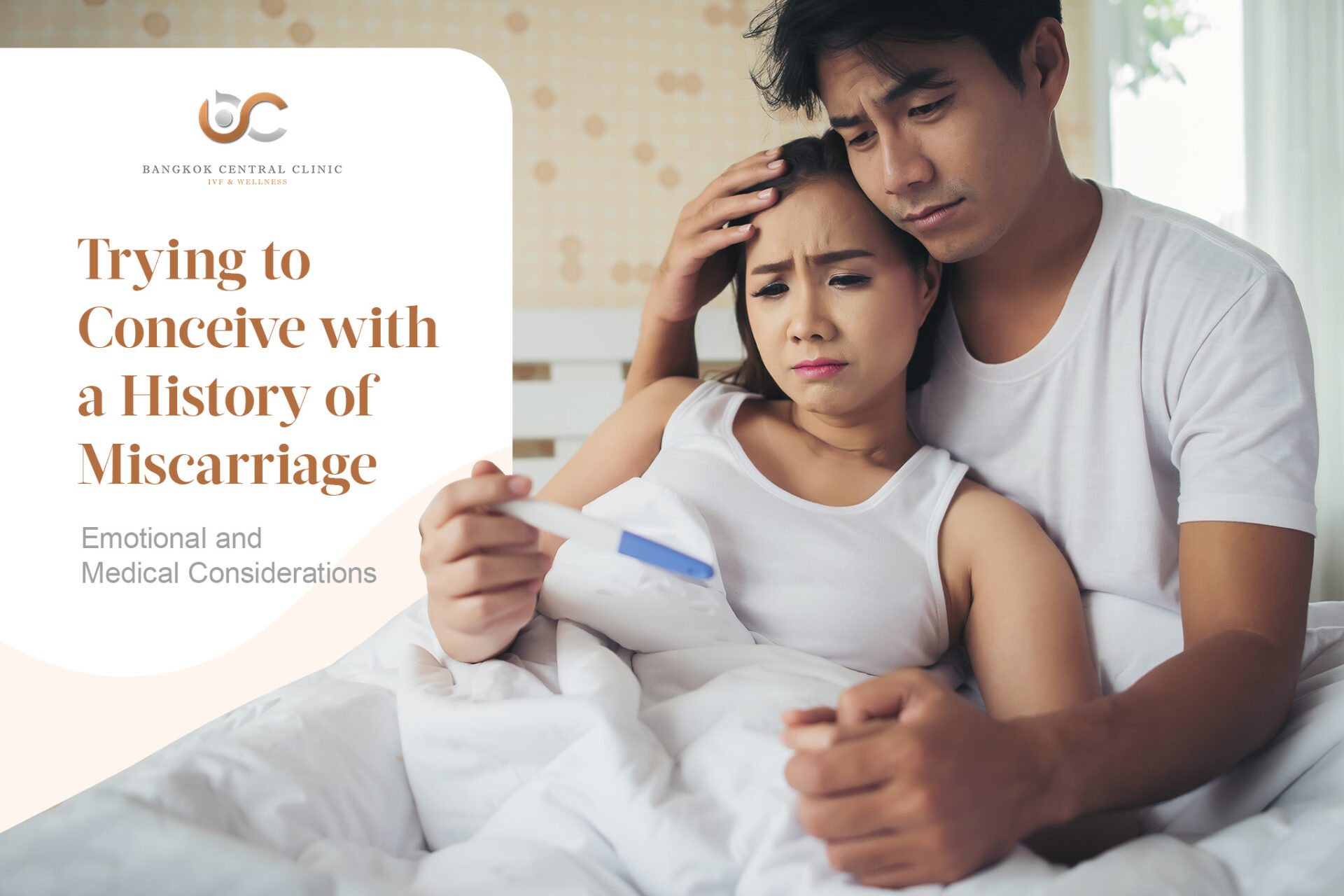HIGHLIGHTS
20 December 2020
5 yoga poses for couples to Enhance your relationship with your partner, level up your happiness in bed.
READ MORE20 December 2020
7 the procedure takes care of yourself and the wife before collecting eggs-collecting sperm.
READ MORE20 December 2020
Protein, a key nutrient of a woman, preparation for pregnancy- preparation for an egg collection.
READ MORE
Why Is It Important for a Health Check Up for Both Male and Female Before Getting Pregnant?
READ MORE
Destination IVF: Why Bangkok is a Premier Choice for International Patients Seeking Fertility Treatment
READ MORETrying to Conceive with a History of Miscarriage: Emotional and Medical Considerations
 06 Feb 2024
06 Feb 2024

After the loss of a child, getting pregnant again is often a difficult process full of doubt and worry. Miscarriage, which is the spontaneous loss of a pregnancy in the first 23 weeks, is more common than many people realize. Around 1 in 8 known pregnancies end in miscarriage. In this article, we share our expertise on this issue and explore some strategies and solutions:
Table of Contents
What are the Causes of Miscarriage?
Although the exact cause of a miscarriage is often impossible to determine, around 50 percent of early pregnancy losses are attributed to problems with the baby’s chromosomes. Factors such as the mother’s age can contribute to these chromosomal abnormalities. Occasionally, health reasons such as poorly controlled diabetes or uterine problems also play a role.
Miscarriages often occur when the unborn child doesn’t develop as it should. In the first trimester, around two thirds of these unfortunate events are associated with chromosomal problems.
Chromosomes are the building blocks of our cells that contain the instructions for our physical and functional characteristics. When an egg meets a sperm, there are two sets of chromosomes, one from each parent. If one of the two sets of chromosomes differs from the typical number, this is a sign that a miscarriage is likely.
What are the Odds of Another Miscarriage?
Experiencing one miscarriage doesn’t necessarily mean that it will happen again. The risk of another miscarriage is around 20 percent after one loss, increasing to 28 percent after two consecutive miscarriages, and reaching 43 percent after three or more. It should be noted that most women who miscarry go on to have healthy pregnancies.
What is the Best Time for Pregnancy After Miscarriage?
It’s important not to rush into trying to get pregnant again after a miscarriage. Ovulation and the possibility of pregnancy may occur as early as two weeks after the loss, although it’s usually not recommended to have sex for two weeks after a miscarriage to avoid infection. When you should start trying to conceive again after a miscarriage depends on both your physical and emotional readiness.
Strong feelings of loss occur after a miscarriage, and the couple may feel depressed, anxious or guilty. The grieving process is different for everyone, so it shouldn’t be rushed. Before resuming the conception process, the first step is to prioritize emotional recovery.
Special Tests Before Conceiving Again
It is essential that women who suffer from two or more consecutive miscarriages consult a healthcare professional. Specialized tests may be recommended to identify potential underlying causes:
- Blood tests: Evaluate hormones or immune system issues.
- Chromosomal tests: Assess if chromosomal factors contribute.
- Procedures: Ultrasound, hysteroscopy, hysterosalpingography, sonohysterography, and MRI can detect uterine problems.
Treatment Options
Corrective surgery for uterine abnormalities, in vitro fertilization (IVF), or other assisted reproductive options may be suggested based on test results. While some miscarriages remain unexplained, the majority of women who experience repeated losses eventually achieve successful pregnancies.
Improving Chances of a Healthy Pregnancy
While preventing miscarriage may not always be possible, making healthy lifestyle choices is crucial for both you and your baby. Here are some points to consider:
- Take a daily prenatal vitamin or folic acid supplement.
- Limit caffeine intake and avoid alcohol, smoking, and illicit drugs during pregnancy.
- Maintain a balanced diet, staying hydrated, and following moderate exercise routines.
- Attend prenatal appointments regularly and communicate any concerns with your healthcare provider.
Emotional Well-being and Moving Forward
Pregnancy after a miscarriage is often accompanied by a rollercoaster of emotions. In addition to the joy of the new pregnancy, anxiety and depression can also remain. It may be helpful to see a therapist or discuss your feelings with a partner, friend or family member.
Referring to a subsequent pregnancy as a “rainbow baby” has been a source of comfort for many. This term symbolizes the colorful light following a dark period of loss. Embracing mixed emotions and allowing oneself time to heal is crucial during this process.
Fertility Impact and Seeking Professional Help
A single miscarriage generally does not impact future fertility significantly. However, if you experience recurrent miscarriages, thorough testing and a fertility check up are recommended to identify potential causes. Only a small percentage of women, around 1%, encounter recurrent pregnancy loss.
After the first miscarriage, seeking guidance from a healthcare professional is advisable. Our fertility clinic in Bangkok is here to provide comprehensive advice and assistance for women trying to conceive after a previous miscarriage.
Frequently Asked Questions: Trying to Conceive with a History of Miscarriage
What Special Tests are Recommended Before Conceiving Again?
For those experiencing two or more consecutive miscarriages, seeking guidance from a healthcare provider is crucial. Specialized tests, including blood tests evaluating hormones or immune system issues, chromosomal tests assessing factors, and procedures such as ultrasound or hysteroscopy, can detect potential underlying causes.
What Treatment Options are Available?
Based on test results, corrective surgery for uterine abnormalities, in vitro fertilization (IVF), or other assisted reproductive options may be suggested. While some miscarriages remain unexplained, the majority of women experiencing repeated losses eventually achieve successful pregnancies.
How Can I Improve the Chances of a Healthy Pregnancy?
While preventing miscarriage isn’t always possible, healthy lifestyle choices are crucial for both you and your baby. Steps include taking a daily prenatal vitamin, limiting caffeine intake, avoiding alcohol, smoking, and illicit drugs during pregnancy, maintaining a balanced diet, staying hydrated, and following moderate exercise routines. Regular prenatal appointments are essential for effective communication with your healthcare provider.
What is the Impact on Fertility and When to Seek Professional Help?
A single miscarriage generally doesn’t significantly impact future fertility. However, for recurrent miscarriages, thorough testing and a fertility check-up are recommended to identify potential causes. Only a small percentage of women, around 1%, encounter recurrent pregnancy loss. Seeking guidance from a healthcare professional is advisable after the first miscarriage, and our fertility clinic in Bangkok offers comprehensive advice and assistance for women aiming to conceive after a previous miscarriage.
HIGHLIGHTS
20 December 2020
5 yoga poses for couples to Enhance your relationship with your partner, level up your happiness in bed.
READ MORE20 December 2020
7 the procedure takes care of yourself and the wife before collecting eggs-collecting sperm.
READ MORE20 December 2020
Protein, a key nutrient of a woman, preparation for pregnancy- preparation for an egg collection.
READ MORE
Why Is It Important for a Health Check Up for Both Male and Female Before Getting Pregnant?
READ MORE


















